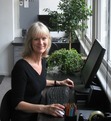Lexi Revellian's Blog, page 21
July 25, 2011
Special offer on Remix and Replica paperbacks
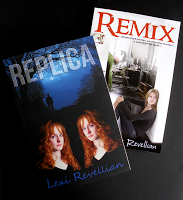 PAPERBACK SALE! (This is supposed to be in big red letters, but Blogger won't have it. Grrr.)
PAPERBACK SALE! (This is supposed to be in big red letters, but Blogger won't have it. Grrr.)
I'm having a sale on my paperbacks.You can buy Remix or Replica , or both together making a larger saving, direct from the author, signed if you wish. Prices include postage and packing.
Remix OR Replica (state which) £6.75Signed? Tell me who to.
 Remix AND Replica, £11.99Signed? Tell me who to.
Remix AND Replica, £11.99Signed? Tell me who to.
Perhaps now is the time for the forward-thinking among my blog readers to stock up with Christmas presents?
Published on July 25, 2011 08:37
July 18, 2011
Dashes: em, en...and tildes
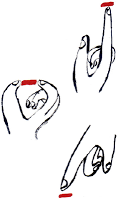 In my occasional series on punctuation, I have reached the dash. Dashes used to be very popular back in the days when a book might begin, "I took a handsome to --- Street, in the small market town of ---, with a view to calling on Lord ---", a sentence that makes me want to hit the author with a rolled-up newspaper until he stops being so annoying. And in more devout times, when the third commandment was taken seriously, characters were wont to exclaim, "By G-d, sir!", another handy use for the dash.
In my occasional series on punctuation, I have reached the dash. Dashes used to be very popular back in the days when a book might begin, "I took a handsome to --- Street, in the small market town of ---, with a view to calling on Lord ---", a sentence that makes me want to hit the author with a rolled-up newspaper until he stops being so annoying. And in more devout times, when the third commandment was taken seriously, characters were wont to exclaim, "By G-d, sir!", another handy use for the dash. These days many writers have an irrational dislike of brackets, and tend to use dashes instead (I like both of them). But what kind of dash do you use? If you are traditionally published, you won't get a choice; the publisher's house style will decide. As an indie, you make up your own mind.
It's the mark of an amateur to use a hyphen where a dash is intended. A hyphen with no spaces either side is even worse, and plain confusing. In typography you have the choice of an em-dash, so called as it is the width of a capital M with no spaces, or an en-dash, the width of a capital N with a space either side. I prefer the en-dash (as used by Penguin) because the spaces allow the text to flow better in digital format, where em-dashes can result in ugly gaps in the text.
And the tilde? For this post I looked it up on Wikipedia, and rather wished I hadn't. I almost certainly don't need to know all that, and neither do you. But it's one of the prettier punctuation marks.
Published on July 18, 2011 04:33
July 10, 2011
On starting a new book
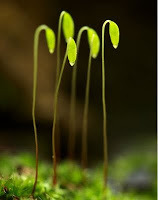 I don't really talk much about my novels until they have reached a tipping point and know I'm going to finish them. Especially in the very early stages, when delicate tendrils of ideas are emerging, vulnerable to tramping feet, icy blasts or harsh words. I make an exception of the offspring, but remind her not to be squashing. So I'm not going to talk about my next book, just the process of switching from one to another.
I don't really talk much about my novels until they have reached a tipping point and know I'm going to finish them. Especially in the very early stages, when delicate tendrils of ideas are emerging, vulnerable to tramping feet, icy blasts or harsh words. I make an exception of the offspring, but remind her not to be squashing. So I'm not going to talk about my next book, just the process of switching from one to another.I've completed four novels now, and found each one of them hard to leave. The final words have been written, all corrections made, it's finished; but the characters are still kicking around in my head. Not until I've found at least one new character equally absorbing can I begin to transfer my allegiance; I have to peg away doggedly until there's an almost audible click, the thing is done and the book begins to fly.
I can see the allure of writing a series. Not just the opportunity to garner a faithful readership, but the switch to the next book must be so much easier when your characters come with you.
Do any of my readers find the same thing? Or are you like Trollope, able to finish one book in the morning and start another in the afternoon?
Published on July 10, 2011 09:13
July 2, 2011
You don't need permission...
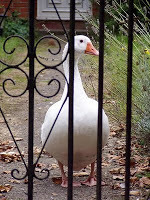 American literary agent Rachelle Gardner wrote a blog post a couple of days ago, Will Self-Pubbing Hurt My Chances? And the answer she gives is,
American literary agent Rachelle Gardner wrote a blog post a couple of days ago, Will Self-Pubbing Hurt My Chances? And the answer she gives is, NO. Self-publishing probably will not hurt your chances of traditional publishing. This is a 180 degree switch from just a few years ago! There was a stigma attached to self publishing, and authors who went that route risked alienating those in traditional publishing. The self-pub author was perceived as someone who was impatient; they [sic] were someone who was unable to pass muster with agents and editors; they put out cheap-looking books that were poorly written and badly edited. But today it's different.
This is good news for authors unable to attract an agent, who feel they need 'permission' to self-publish. The industry is beginning to give its blessing to those pesky indies it was once so scathing about. Perhaps more... one commenter wrote, "I'm worried that publishers will start to expect an author coming to them to already have readership and sales numbers in hand."
What I want to say in big letters is, YOU DON'T NEED PERMISSION. Just a good book, because validation can only be given by readers: not agents, editors or marketing departments.
Konrad Lorenz tells a story about the geese he kept. Each morning he would open the gate to the small compound where they spent the night to allow them to roam freely during the day. One morning, he saw from his window he'd forgotten to close the gate the night before, so he didn't need to open it. A while later, he noticed the geese were still in their compound, making dissatisfied noises. The gate was open, but they would not go through it until he went over, shut it, and opened it again with a flourish. This ceremony over, they went off to forage.
Don't be like those geese. Agents and publishers are losing some of their power. They are becoming aware of this, and so should we be.
Published on July 02, 2011 01:59
June 25, 2011
On numbers and what they mean
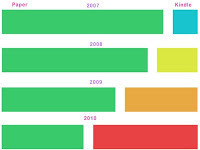 Any indie with a book doing reasonably well on Amazon is obsessed by numbers, and Amazon makes it easy to indulge one's obsession.
Any indie with a book doing reasonably well on Amazon is obsessed by numbers, and Amazon makes it easy to indulge one's obsession. Once an hour, rankings change. On Author Central, you have a sales graph going back to December last year. You can watch sales tick up on your KDP page (Kindle Direct Publishing) as they happen - last night I waited before turning out the light for the last few UK sales that would take Replica to a total of 7,000. Childish, I know.
What I don't forget, though, is that each time the number goes up, a human being has decided he/she likes the look of my book, and is prepared to spend several hours reading it, and I am very grateful. Now and then, readers write a review, or email me to say they enjoyed the books, which makes my day.
David Gaughran has blogged about some other very interesting numbers, under the title Print Continues Its Death Spiral ; the American Association of Publishers have released their sales figures for April 2011. The figures make it clear where books are heading - away from print and towards digital. The implications of this are enormous for writers, readers, and anyone in the publishing industry.
Winners and losers in the revolution? My guess:
Winners Authors and readers - it's often forgotten, but they're the only essential components of the business. And Amazon, whose business nous is awesome.
Losers Bookshops (we'll all be sad about this), publishers, agents.
Published on June 25, 2011 02:44
June 23, 2011
You will identify with one of these...
...and so do I, but I'm not going to admit which one. I have my pride.
Published on June 23, 2011 01:47
June 19, 2011
E-book piracy:Yo ho ho and what happens next?
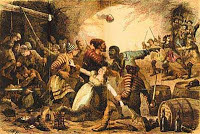
Google Alerts alerted me last week to a site where Remix can be downloaded for free. I checked with a knowledgeable friend, and yes, the book is indeed available for download, not just there as an inducement to buy membership to their site. I'm surprised, as a) I'm not a famous author, and b) Amazon charges £0.49 or $0.99 for Remix – hardly prices worth evading. But then, the book has been in the UK top 100 for 209 days…
This got me thinking about ebook piracy, so I did some research, and these are my conclusions:
Ebook piracy is happening now. DRM offers little or no protection.Many of the early adopters of the Kindle are middle-aged; they can afford it, adjustable font sizes are good for ageing eyes, and it's an easy gadget to use even if you haven't been brought up with computers and mobile phones from earliest youth. This age group is less likely to use pirate sites.
Younger readers aren't buying Kindles at the moment, thinking them overpriced and that the technology will only improve. This doesn't mean they don't download pirated books and read them on their computers. Or smart phones, a recent development.
As e-readers get cheaper and more common, people used to downloading their music for nothing from torrents will expect to do the same with e-books. A quick search shows you can download the BBC list of top 100 books. It's in pdf format, but it's easy enough to convert to epub or other formats.
Publishers are encouraging piracy by their determination to maintain high ebook prices, causing resentment among e-reader owners. One reason they give for high prices (and low digital royalties for authors) is they need to spend money to prevent copyright infringement; but it's not clear quite what they are doing, beyond giving more money to their legal departments, and hoping e-books are a passing fad.If the experience of the music industry is anything to go by, publishers will not be able to stop piracy even if they try wholeheartedly to do so, and they have no Plan B. Witness the whole huge amount of effort put into trying to shut down The Pirate Bay - legal proceedings have been going on for years, and yet the site is still up. Maybe I'm being naïve, but I can't see any way that they will be able to stop people illegally downloading without heavily censoring the internet. I don't believe people would stand for that.
This is a big problem for authors that will only get bigger. I've no idea what the answer is.
EDIT : I sent the site a Cease & Desist notice, and the page has been taken down.
Published on June 19, 2011 06:09
June 11, 2011
Mainstream versus indie authors
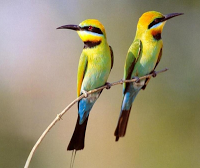 ...or, the farmer and the cowboy should be friends.
...or, the farmer and the cowboy should be friends.Last week, Robin Sullivan, who successfully runs the indie small press Ridan, was banned from AbsoluteWrite with the following message from the administrator:
"You have been banned for the following reason: Just get the hell off my site. You're relentlessly snotty, rude, and you're a fucking bald-faced liar. I'm done with you.
Date the ban will be lifted: Never."
Nice. Robin's offence? To politely argue the case for indie publishing on AbsoluteWrite's forums on this thread. On AbsoluteWrite, they don't like self-publishers. Mention that some indies have done rather well, and you are likely to be ignored or disbelieved. The majority of members are wedded to the way things are currently run in the publishing industry, however much evidence accrues that it is broken.
Why are they quite so vitriolic? I have a theory. It can be pretty discouraging, being a writer. You toil away on your own for years, learning how to write, then you reach stage one: submit to agents. Suppose you get an agent (and only a handful of writers I know have achieved this) she will submit your book to publishers. They take their time to reply, and you may find after a year or so your agent has used all her contacts and failed to place your book.
If you are lucky enough to find a publisher, you will wait eighteen months or more to see your novel in print. As a new author you are unlikely to get much of an advance (I know of two exceptions to this, Guy Saville and Elspeth Cooper). With little of the publisher's money invested in it, your book will not get much hype or a favourable spot in the bookshops. 90% of new authors sell fewer than 1,000 copies and don't earn out their advance. Unless you sell surprisingly well, after some months your unsold books will be returned and pulped.
Anyone committed to this dismal system, accepting repeated rejection with gritted teeth and the mantra I'll write another book, is likely to be touchy with those she sees leaping over the gatekeepers and making their books available to readers within weeks of finishing them. It makes it even worse that some of these writers are doing rather well out of it. Stockholm Syndrome kicks in.
The most clued-up authors think that a mixture of indie and traditional publishing is the best way to go. Being hostile to writers who have chosen a different route is pointless - and anyone who subsequently switches sides is going to feel really foolish.
Not the bigots at AbsoluteWrite, though. They know what they think, and you'd better agree with them if you go on their site.
(I choose not to, myself.)
Published on June 11, 2011 09:28
June 4, 2011
The author, the agent and the cover artist
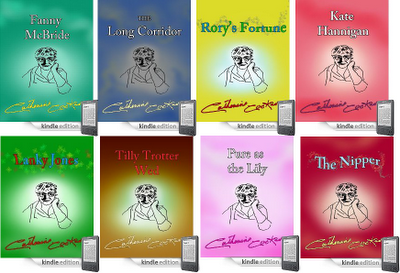 The publishing industry is in a strange but interesting state, with everyone trying out each other's jobs. This story caught my eye.
The publishing industry is in a strange but interesting state, with everyone trying out each other's jobs. This story caught my eye.Catherine Cookson's books were published long before ebooks were thought of, so her publishers, Transworld and Simon & Schuster don't hold the rights. Catherine Cookson's estate has authorized her agent Sonia Land to release a hundred of her books for Kindle in an exclusive deal with Amazon. Priced at £3.99, I'm sure Cookson's many fans will be delighted.
What struck me as odd is how Sonia Land has published the novels. She's started her own company, and called it Peach Publishing, in spite of the fact that there is already a Peach Publishing in existence in the UK with a website here. Sonia Land's website is still under construction. Did she not think to google the name?
And then there's the covers... I move in indie circles, and have seen a few amateur book covers in my time, but these take the biscuit. How any professional in the publishing industry could think these acceptable beats me. They aren't just ugly and cheap-looking, they're inept.
Perhaps Ms Land has the visual equivalent of a tin ear, or maybe she reflected that Catherine Cookson's books would sell however dire the covers. Maybe the designs were done by a relative, and she found it hard to be objective. I do hope she didn't do them herself...
Whatever the explanation, I wouldn't want her choosing a cover artist for my books.
Published on June 04, 2011 09:51
May 30, 2011
Sales, publishing and salads
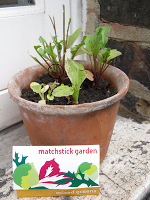 Yesterday sales of Replica went over 5,000 - not bad in seven weeks. And most commenters who have read both books think it's a worthy follow-up to
Remix
. I'm sure all authors worry over this; you spend a year writing a novel and really don't want readers saying, It was okay, but not as good as her last.
Yesterday sales of Replica went over 5,000 - not bad in seven weeks. And most commenters who have read both books think it's a worthy follow-up to
Remix
. I'm sure all authors worry over this; you spend a year writing a novel and really don't want readers saying, It was okay, but not as good as her last. If anyone had told me a year ago I'd sell over 27,000 books in ten months I'd have been astonished, which makes me think about that stratospherically successful indie hero, Amanda Hocking. I've just watched her amusing first vlog, and one of the things she talks about is her decision to self-publish. She says, "I had to do something other than just sit here and wait." And doesn't the publishing industry know how to make us wait, whether it's for a response to submissions or publication after the contract's been signed. (Can anyone tell me why it takes eighteen months to get a book into print?)
And what, I hear you cry, is the significance of the photo? Not a lot, admittedly, but every now and then I like to post something random just because I can. A month ago I bought a matchstick garden; like a book of matches, but stick them in the earth and they grow into a salad. So I did that, and sure enough, leaves sprouted. Not many, and growing rather slowly; in fact, it looked like the sort of salad that would make an ideal accompaniment to Baldrick's very small casserole made from five beans. Then one day it seemed to be growing backwards. Two caterpillars had moved in. As they get bigger they eat more, and I'm beginning to wonder whether I'll have to buy in salad leaves to stop them dying of starvation. I've marked one with a ring on the photo. The other one is there, but you can't see him.
Published on May 30, 2011 02:37

